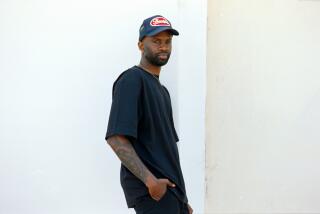A Son’s View of Father’s Trek to Monasticism
- Share via
What makes people join a monastic order or enter a convent? Do they hear voices, as Joan of Arc did, or see a blinding flash of light like St. Paul? “The Father and the Son” is an intensely personal memoir suggesting that religious vocations are borne out of convictions that have deepened and clarified over a lifetime, not from an instantaneous conversion like those in the traditional stories of saints. Matt Murray, a Wall Street Journal reporter, perhaps would never have written about religious devotion if it weren’t for his father, James, a government retiree and widower, who became a Benedictine monk when Murray was in college.
“The very idea of joining a religious community was completely outside my experience,” Murray writes. “But from my doubts I could not leap to the conclusion that my father was following a fruitless path.”
“The Father and the Son” is not a meditation akin to Kathleen Norris’ “The Cloister Walk,” a book that brought renewed attention to the contemplative life. It’s a conversion story told by a spectator; a candid look at a son’s attempt to reconcile with his father, who realized after his wife’s death that God was calling him to be a monk, not, as he says, “a fading parent who was going to stay around fifty-two weeks a year for the times when my children were going to come home.”
To understand how “a boy from a small town in New York State had become an old man in a monk’s robe with four children,” Murray interviews his father and relatives; and consults his parents’ ample letters and diaries. But it is the monks of St. Bede’s Abbey in Peru, Ill. (where James now lives) who provide the best insight into his story.
“What monks desire most,” they tell him, “is contained in the word monasticism itself, which derives from the Greek word monos, meaning ‘single’ or ‘alone.’ ” Piecing together his father’s life, Murray notices that James had always had a “strange inner peace” and a “penchant for solitude,” from his Depression-era upbringing and into adulthood.
With such a solitary temperament, James pursued a literary career for many years (writing a novel, which publishers rejected; having his plays staged in a local playhouse). But the real writer in the Murray household was James’ wife, Michele, who forged a career as a critic and poet before her death at 40 from breast cancer. Murray paints a poignant picture of his mother, caught between her Olympian flights of genius and the burdens of raising a family. And, at this point, one catches the faintest whiff of predictability: Murray, one assumes, will show that James’ monastic vow was a retreat from the world after losing his beloved wife. But his anecdotes of his parents’ domestic life only reinforce the portrait of James as an aloof, remote personality. “My sister once observed that he loved his children,” Murray writes, “but the way an astronomer loves his stars.”
With early retirement and widowhood, James attended Mass to fill the void. His youthful doubts about Catholicism were soon washed away by crying bouts in Mass: James calls this “the gift of tears” and proudly notes that the Jesuit founder, St. Ignatius, had them too. The last child in the household, Murray watched as his father’s devotion deepened. Though he promised to financially care for his family (he sold the house when Murray was in college), James felt, on a retreat at St. Bede’s, that “this was where he was meant to be.”
Murray’s objectivity provides the book with its greatest strength, sparing readers of the emotional frothiness that typifies so many conversion stories. James’ aimless travels as he waited for his calling to take shape or Murray’s lonely college years (his siblings are only marginally present in the story) might’ve been rendered with more outrage, but Murray tempers his feelings with trust: “I knew he saw a purpose, even if I could not fathom what it was.”
“The Father and the Son” doesn’t preach to the choir: James is easy to dislike, especially in his tough attitude to his family. But Murray balances this seemingly chilly reply with an image of his father taking his final vows, prostrate in his black robe before the cross. He is awed by a monk’s life at an age when others are taking cruises and sleeping late.
“Dad suddenly seemed like the only man I had ever known who had followed his beliefs to their limits,” he writes. “The Father and the Son” is a courageous book; in describing the long germination of his father’s religious vocation, Murray reminds us that other things--like a son’s understanding--also ripen beautifully with the passage of time.
More to Read
Sign up for our Book Club newsletter
Get the latest news, events and more from the Los Angeles Times Book Club, and help us get L.A. reading and talking.
You may occasionally receive promotional content from the Los Angeles Times.







